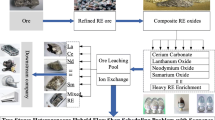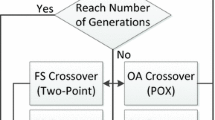Abstract
A large number of studies have been conducted in the area of semiconductor final test scheduling (SFTS) problems. As a specific example of the simultaneous multiple resources scheduling problem, intelligent manufacturing planning and scheduling based on meta-heuristic methods, such as the genetic algorithm (GA), simulated annealing, and particle swarm optimization, have become common tools for finding satisfactory solutions within reasonable computational times in real settings. However, only a few studies have analyzed the effects of interdependent relations during group decision-making activities. Moreover, for complex and large problems, local constraints and objectives from each managerial entity and their contributions toward global objectives cannot be effectively represented in a single model. This paper proposes a novel cooperative estimation of distribution algorithm (CEDA) to overcome these challenges. The CEDA extends a co-evolutionary framework incorporating a divide-and-conquer strategy. Numerous experiments have been conducted, and the results confirmed that CEDA outperforms hybrid GAs for several SFTS problems.








Similar content being viewed by others

References
Baluja, S. (1994). Population-based incremental learning: A method for integrating genetic search based function optimization and competitive, learning. CMU-CS-94-163.
Baluja, S., & Caruana, R. (1995). Removing the genetics from the standard genetic algorithm. In Proceedings of the twelfth international conference on, machine learning (pp. 38–46).
Blazewicz, J., Lenstra, J. K., & Kan, A. H. G. R. (1983). Scheduling subject to resource constraints: Classification and complexity. Discrete Applied Mathematics, 5(1), 11–24.
Brucker, P., Drexl, A., Möhring, R., Neumann, K., & Pesch, E. (1999). Resource-constrained project scheduling: Notation, classification, models, and methods. European Journal of Operational Research, 112(1), 3–41.
Chien, C.-F. (2007). Made in Taiwan: Shifting paradigms in high-tech industries. Industrial Engineer, 39(2), 47–49.
Chien, C.-F., & Chen, C.-H. (2007a). Using genetic algorithms (GA) and a colored timed Petri net (CTPN) for modeling the optimization-based schedule generator of a generic production scheduling system. International Journal of Production Research, 45, 1763–1789.
Chien, C.-F., & Chen, C.-H. (2007b). A novel timetabling algorithm for a furnace process for semiconductor fabrication with constrained waiting and frequency-based setups. OR Spectrum, 29(3), 391–419.
Chien, C.-F. & Kuo, R.-T. (2012). Beyond make-or-buy: Cross-company short-term capacity backup in semiconductor industry ecosystem. Flexible Services Manufacturing Journal. doi:10.1007/s10696-011-9113-4. (in press).
Chien, C.-F., & Zheng, J.-N. (2012). Mini-max regret strategy for robust capacity expansion decisions in semiconductor manufacturing. Journal of Intelligent Manufacturing, 23(6), 2151–2159.
Chien, C.-F., Chen, H.-K., Wu, J.-Z., & Hu, C.-H. (2007a). Constructing the OGE for promoting tool group productivity in semiconductor manufacturing. International Journal of Production Research, 45(3), 509–524.
Chien, C.-F., Wang, H., & Wang, M. (2007b). A UNISON framework for analyzing alternative strategies of IC final testing for enhancing overall operational effectiveness. International Journal of Production Economics, 107(1), 20–30.
Chien, C.-F., Chen, Y.-J., & Peng, J.-T. (2010a). Manufacturing intelligence for semiconductor demand forecast based on technology diffusion and product life cycle. International Journal of Production Economics, 128(2), 496–50.
Chien, C.-F., Wu, J.-Z., & Weng, Y.-D. (2010b). Modeling order assignment for semiconductor assembly hierarchical outsourcing and its decision support system. Flexible Services and Manufacturing Journal, 22(1–2), 109–139.
Chien, C.-F., Dauzére-Pérés, S., Ehm, H., Fowler, J. W., Jiang, Z., Krishnaswamy, Lee T.-E., et al. (2011a). Modeling and analysis of semiconductor manufacturing in a shrinking world: Challenges and successes. European Journal of Industrial Engineering, 5(3), 254–271.
Chien, C.-F., Wu, J.-Z., & Wu, C.-C. (2011b). A two-stage stochastic programming approach for new tape-out allocation decisions for demand fulfillment planning in semiconductor manufacturing. Flexible Services and Manufacturing Journal. doi:10.1007/s10696-011-9109-0.
Gen, M., & Cheng, R. (2000). Genetic algorithms and engineering optimization. New York: Wiley-Interscience.
Gen, M., Cheng, R., & Lin, L. (2008). Network models and optimization: Multiobjective genetic algorithm approach. Berlin: Springer.
Gerwin, D. (1993). Manufacturing flexibility: A strategic perspective. Management Science, 39(4), 395–410.
Guo, Y. W., Li, W. D., Mileham, A. R., & Owen, G. W. (2009). Optimisation of integrated process planning and scheduling using a particle swarm optimisation approach. International Journal of Production Research, 47(14), 3775–3796.
Kim, Y. K., Kim, J. Y., & Shin, K. S. (2007). An asymmetric multileveled symbiotic evolutionary algorithm for integrated FMS scheduling. Journal of Intelligent Manufacturing, 18, 631–645.
Li, W. D., & McMahon, C. A. (2007). A simulated annealing-based optimization approach for integrated process planning and scheduling. International Journal of Computer Integrated Manufacturing, 20(1), 80–95.
Mönch, L., Fowler, J. W., Dauzère-Pérès, S., Mason, S. J., & Rose, O. (2011). A survey of problems, solution techniques, and future challenges in scheduling semiconductor manufacturing operations. Journal of Scheduling, 14(6), 583–599.
Potter, M. A., & de Jong, K. A. (2000). Cooperative coevolution: An architecture for evolving coadapted subcomponents. Evolutionary Computation, 8(1), 1–29.
Shih, W., Chien, C.-F., Shih, C., & Chang, J. (2009). The TSMC way: Meeting customer needs at Taiwan Semiconductor Manufacturing Co. Harvard Business School Technology & Operations Management Unit Case (610-003).
Tan, K. C., Yang, Y. J., & Goh, C. K. (2006). A distributed cooperative coevolutionary algorithm for multiobjective optimization. IEEE Transactions on Evolutionary Computation, 10(5), 527–549.
Uzsoy, R., Lee, C. Y., & Martin-Vega, L. (1992). A review of production planning and scheduling models in the semiconductor industry, part I: System characteristics, performance evaluation, and production planning. IIE Transactions, 24, 47–60.
Uzsoy, R., Martin-Vega, L., Lee, C., & Leonard, P. (1991). Production scheduling algorithms for a semiconductor test facility. IEEE Transactions on Semiconductor Manufacturing, 4(4), 270–280.
Wu, J.-Z. (2011). Inventory write-down prediction for semiconductor manufacturing considering inventory age, accounting principle, and product structure with real settings. Computers & Industrial Engineering. doi:10.1016/j.cie.2011.11.020). (in press).
Wu, J.-Z., & Chien, C.-F. (2008a). Modeling strategic semiconductor assembly outsourcing decisions based on empirical settings. OR Spectrum, 30(3), 401–430.
Wu, J.-Z., & Chien, C.-F. (2008b). Modeling semiconductor testing job scheduling and dynamic modeling semiconductor testing job scheduling and dynamic testing machine configuration. Expert Systems with Applications, 35(1–2), 485–496.
Wu, J.-Z., & Hsu, C.-Y. (2009). Critical success factors for improving decision quality on collaborative design in the IC supply chain. Journal of Quality, 16(2), 95–108.
Wu, J.-Z., Chien, C.-F., & Gen, M. (2012a). Coordinating strategic outsourcing decisions for semiconductor assembly using a bi-objective genetic algorithm. International Journal of Production Research, 50(1), 235–260.
Wu, J.-Z., Hao, X.-C., Chien, C.-F., & Gen, M. (2012b). A novel bi-vector encoding genetic algorithm for the simultaneous multiple resources scheduling problem. Journal of Intelligent Manufacturing, 23(6), 2255–2270.
Zhang, W., & Gen, M. (2010). Process planning and scheduling in distributed manufacturing system using multiobjective genetic algorithm. IEEJ Transactions on Electrical and Electronic Engineering, 5(1), 62–72.
Acknowledgments
This work was partly supported by the Grant-in-Aid for Scientific Research of Japan Society of Promotion of Science (C) (Grant No. 245102190001), the National Science Council, Taiwan (NSC101-2811-E-007-004; NSC100-2410-H-031-011-MY2; NSC100-2628-E-007-017-MY3), and the Advanced Manufacturing and Service Management Research Center of National Tsing Hua University (101N2073E1).
Author information
Authors and Affiliations
Corresponding author
Rights and permissions
About this article
Cite this article
Hao, XC., Wu, JZ., Chien, CF. et al. The cooperative estimation of distribution algorithm: a novel approach for semiconductor final test scheduling problems. J Intell Manuf 25, 867–879 (2014). https://doi.org/10.1007/s10845-013-0746-x
Received:
Accepted:
Published:
Issue Date:
DOI: https://doi.org/10.1007/s10845-013-0746-x



